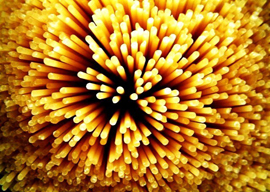
May 20, 2012

But give me a Big Mac and large fries over an Italian pizza any day. You can”t get a decent pizza north of the Gustav Line, which is way to the south of me. It was the frontline in the winter of 1943/44 and ran, roughly speaking, between Pozzuoli in the west (where Sophia Loren was born) and San Giovanni Rotondo in the east (where Padre Pio, the flying friar with the stigmata, died).
The potato is a far superior basic ingredient than pasta: It is far tastier and healthier, far more versatile, and it is not man-made. True, the Italians have dozens of types of pasta, but what actual difference do length or circumference make when we”re talking about pasta? Does it matter whether it is shaped like a hat, a shell, or a star; a piece of straw or hay; a length of string, rope, or tubing; a dishcloth; or even a bloody butterfly? It is all just pasta, isn”t it?
George Orwell wrote in his superb 1945 essay “In Defence of English Cooking“: “It is commonly said, even by the English themselves, that English cooking is the worst in the world….Now that is simply not true.” Orwell, who lived much of his short life abroad, singled out for praise “the various ways of cooking potatoes peculiar to our own country” and in particular “potatoes roasted under the joint.” He spoke of the wonders of English puddings and cakes, of Devonshire cream, Dublin prawns, Oxford marmalade, and English bread: “If there is anything quite as good as the soft part of the crust from an English cottage loaf…I do not know it.”
There are one or two types of decent bread in Italy, but nearly all are light as dust and dry as a bone. And there is nothing here to beat a good old English Sunday roast with potatoes roasted under the joint of course. Furthermore, there has been a revolution in British cooking during the past 25 years inspired by immigration. British chefs such as Nigella Lawson pop up on television screens all over the world to explain how it’s done.
When I tell Italians that English cooking beats theirs 10-nil, they angrily refuse to countenance the idea: “Just fuck off back to England, inglese di merda!”
By pure chance the other day, after years of insipid Gorgonzola and leathery old Pecorino, I found a decent cheese in a local delicatessen. At 38 euros a kilo, it is obscenely expensive. But by God, is it good. It is Stilton, the king of cheeses”English, of course.